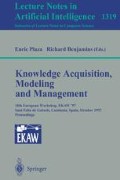Abstract
Many researchers agree that the reuse of ontological components is an important research area in Knowledge Acquisition. However, it has been argued that there is still much to do in this field. For example, one of the topics that requires more research is that of developing methods to build ontologies. In this sense, it is important to define formal methods which provide us with operative frameworks to build ontologies. In this paper, for problems that satisfy a well-defined set of assumptions, we propose a mathematical approach that permits to build domain knowledge ontologies. We present such an operative framework based on both Sets Theory and mereological considerations. The approach comprises a set of ontological operators to extract domain knowledge. Finally, an example is put forward showing the application of these ontological operators.
Preview
Unable to display preview. Download preview PDF.
References
Alberts, L. K. (1993). YMIR: an ontology for engineering design, PhD Thesis, University of Twente.
Benjamins, V.R. (1993). Problem Solving Methods for diagnosis, PhD Thesis, University of Amsterdam.
Borst, P., and Akkermans, H. (1997). Engineering Ontologies, International Journal ofHuman-Computer Studies, 46: 365–406.
Chandrasekaran, B. (1987). Towards a functional architecture for intelligence based on generic information processing tasks, In Proceedings of the 10th IJCAI, 1183-1192, Milan, Italy.
Cooke, N. J. (1994).Varieties of knowledge elicitation techniques, International Journal ofHuman-Computer Studies, Vol. 41:801–849.
Cordingley, E. S. (1989). Knowledge elicitation techniques for knowledge-based systems, In D. Diaper Ed. Knowledge Elicitation: Principles, Techniques, and Applications, 89–175, New York: John Wiley and Sons.
Eschenbach, C., and Heydrich, W. (1995). Classical mereology and restricted domains, International Journal ofHuman-Computer Studies, 43: 723–740.
Gruber, T.R (1993). A Translation Approach to Portable Ontology Specifications, Knowledge Acquisition, 5 (2): 199–220
Gruber, T.R. (1994). Towards principles for the design of ontologies used for knowledge sharing, In N. Guarino and R. Poli (Eds.), Formal Ontology in Conceptual Analysis and Knowledge Representation, Boston, MA: Kluwer.
Guarino, N. (1997). Understanding, building and using ontologies, International Journal ofHuman-Computer Studies, 46:293–310.
Guarino, N., and Giaretta, P. (1995). Ontologies and knowledge bases: towards a terminological clarification, In Mars, N. Ed., Towards Very Large Knowledge Bases: Knowledge Building and Knowledge Sharing 1995, 25–32, Amsterdam, IO Press.
Leonard, H.S., and Goddman, N. (1940). The calculus of individuals and its uses, Journal of Symbolic Logic, 5: 45–55.
Lesniewski, S. (1916). Foundations of a general theory of manifolds (in Czech), Prace Polskiego Kola Naukowe w Moskwie, Sekcya matematycznoprzyrodnicza, 2, Moscow.
Martinez-Bójar, V.R., Benjamins, R., Martin, F., and Castillo, V. (1996). Deriving formal parameters for comparing knowledge elicitation techniques based on mathematical functions, In B. R. Gaines and M. Musen (Eds.), Proceedings of the 10th Banff Knowledge Acquisition for Knowledge-Based Systems Workshop, Vol. 2: 59.1–59.20, Banff, Canada.
Martinez-Béjar, R, Cädenas, J. M., and Martin-Rubio, F.(1997). Fuzzy Logic in Landscape Assessment, In Proceedings of the European Symposium on Intelligent Techniques, 234–238, Bari, Italy.
Martinez-Béjar, R., and Martin-Rubio, F. (1997). A mathematical functions-based approach for analysing elicited knowledge, To appear in Proceedings of the Ninth International Conference on Software Engineering and Knowledge Engineering, Madrid, Spain.
Musen, M. A. (1989). Automated support for building and extending expert models, Machine learning, 4: 347–376.
O'Hara, K., Motta, E., and Shadbolt, N. (1994). Grounding GDMs: A Structured Case Study, International Journal ofHuman-Computer Studies, Vol. 40: 315–347.
Puerta, A. R., Egar, J., Tu, S., and Musen, M. (1992). A multiple-method shell for the automatic generation of Knowledge acquisition tools, Knowledge Acquisition, 4:171–196.
Schreiber, A. T. (1993). Operationalizing models of expertise, In A. T. Schreiber, B. J. Wielinga, and J. A. Breuker (Eds.), KADS. A Principled Approach to Knowledge-Based System Development, 119–149, London: Academic Press.
Schreiber, A. T., Wielinga, B:J, and Jansweijer, W.H.J (1995). The KACTUS View on the ‘O’ Word, In D. Skuce, N. Guarino and L. Bouchard (Eds) IJCAI Workshop on Basic Ontological Issues in Knowledge Sharing
Simons, P. (1987). Parts, A Study in Ontology, 5–128, Oxford: Clarendon Press.
van Heijst, G., Schreiber, A. T., and Wielinga, B. J. (1997). Using explicit ontologies in KBS development, International Journal of Human-Computer Studies, 45: 183–292.
Wielinga, B. J., Schreiber, A. T., and Breuker, J. A. (1992). KADS: a modelling approach to knowledge engineering, Knowledge Acquisition, Vol. 4:5–53.
Author information
Authors and Affiliations
Editor information
Rights and permissions
Copyright information
© 1997 Springer-Verlag Berlin Heidelberg
About this paper
Cite this paper
Martinez-Béjar, R., Benjamins, V.R., Martín-Rubio, F. (1997). Designing operators for constructing domain knowledge ontologies. In: Plaza, E., Benjamins, R. (eds) Knowledge Acquisition, Modeling and Management. EKAW 1997. Lecture Notes in Computer Science, vol 1319. Springer, Berlin, Heidelberg. https://doi.org/10.1007/BFb0026784
Download citation
DOI: https://doi.org/10.1007/BFb0026784
Published:
Publisher Name: Springer, Berlin, Heidelberg
Print ISBN: 978-3-540-63592-5
Online ISBN: 978-3-540-69606-3
eBook Packages: Springer Book Archive

